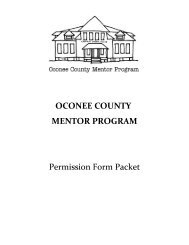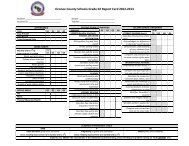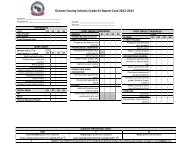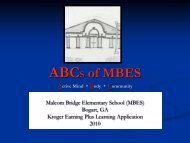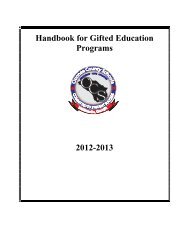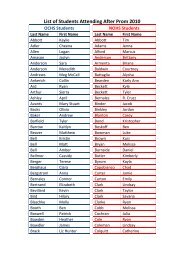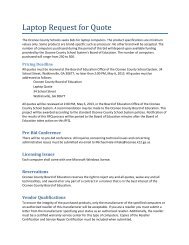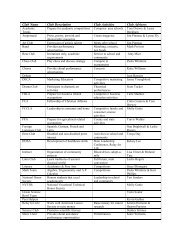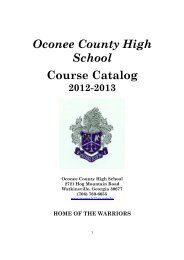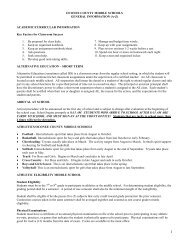North Oconee High - Oconee County Schools
North Oconee High - Oconee County Schools
North Oconee High - Oconee County Schools
Create successful ePaper yourself
Turn your PDF publications into a flip-book with our unique Google optimized e-Paper software.
Accreditation Report<br />
<strong>North</strong> <strong>Oconee</strong> <strong>High</strong> School<br />
stakeholders in that process (2.4 & 2.5). Evidence shows BOE policies/practices don't clearly support the school's purpose, direction, and<br />
effective operation, as has been evidenced in NOHS administrative turnover recently (G); furthermore, BOE did not act in accordance with<br />
defined roles and responsibilities that are ethical and free of conflict of interest (H). This behavior was cited in multiple incidents in our survey<br />
of the previous administration (G). Policies and practices that provide requirements and oversight of fiscal management are clearly found at<br />
both the system (I) and school level (J). Most policies and practices promote effective instruction and assessment that produce equitable and<br />
challenging learning experiences for all students (K); however, this is not supported by large classes, when a third of those students might<br />
require individualized, differentiated instruction according to IEPs, 504s, etc (G). Many teachers aren't trained to implement this properly, and<br />
this certainly doesn't support the effective operation of a school. While fiscal issues are recognized, this should be a top priority. However,<br />
previous SIP had a top down approach and accessibility was problematic (L). There are policies and practices regarding professional growth<br />
of staff (M), but more needs to be done in specific areas, especially when dealing with larger class sizes and collaboration (L). However,<br />
recently, more specialized opportunities are offered, especially peer training (N). BOE members have their own professional development<br />
(E). Leaders sometimes communicate effectively with stakeholder groups, provide opportunities for stakeholders to shape decisions, solicit<br />
feedback from stakeholders, work collaboratively on school improvement efforts, and provide some leadership roles for stakeholders. School<br />
leaders' efforts result in some stakeholder participation and engagement in the school; however, there is a sense that not everyone is<br />
included in decisions because committee membership is not rotated (O), and those included on decisions are only those involved with<br />
specific school organizations, not all stakeholders (F). Most information is disseminated via one medium (electronic), and not everyone has<br />
easy access (F).<br />
To improve, the SIP should be part of the driving force in curriculum planning. Just like teachers reference state standards, our SIP should be<br />
equally important in order to address areas of identified weaknesses. Communication with all stakeholders (parents, students, faculty/staff)<br />
must be expanded to include mediums other than electronic. School committee membership should rotate so that all stakeholders are<br />
included and fresh insights are available. The BOE must employ ethical and transparent policies without prejudice. Professional development<br />
should support goals identified in the SIP. We should explore alternatives beyond what we are currently doing to improve the operation of our<br />
school; for example, addressing class size by hand scheduling high risk students instead of relying on the computer. All strategies must<br />
enhance student achievement in academics and citizenship. It is imperative that all decisions made regarding policies and practices for<br />
school operation reflect<br />
SY 2012-2013 Page 17<br />
© 2013 AdvancED www.advanc-ed.org



